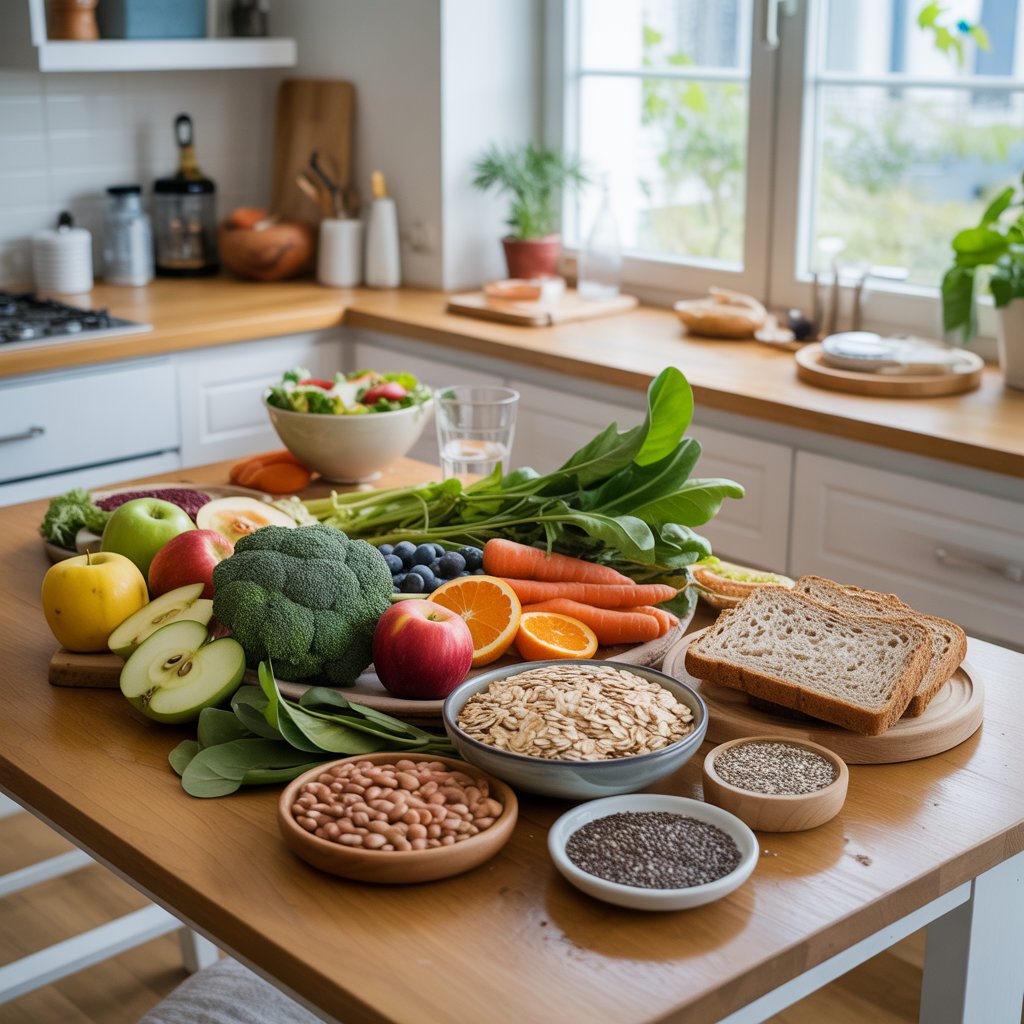
Fiber is one of the most underrated nutrients in our daily diet. It doesn’t just help you stay regular, it also supports weight loss, gut health, and even heart health. Yet, most people don’t get enough fiber every day. If you want to feel lighter, improve digestion, and burn fat more efficiently, adding fiber-rich foods is the way to go.
In this blog, we’ll explore the best fiber-rich foods you should include in your daily diet.
Why Fiber is So Important
Before jumping into the food list, let’s understand why fiber matters:
- Improves Digestion – Prevents constipation and bloating.
- Supports Weight Loss – Keeps you full for longer and reduces cravings.
- Balances Blood Sugar – Slows down sugar absorption.
- Boosts Heart Health – Lowers cholesterol naturally.
- Feeds Good Gut Bacteria – Supports a healthy microbiome.
Daily fiber requirement:
- Women: 21–25 grams
- Men: 30–38 grams
1. Lentils and Beans
- Lentils, black beans, kidney beans, and chickpeas are fiber powerhouses.
- They also provide protein, making them a great choice for vegetarians.
Fiber content: 1 cup of cooked lentils = ~15 grams of fiber.
– Add them to soups, salads, or make a tasty hummus.
2. Whole Grains
- Oats, brown rice, barley, and quinoa are loaded with soluble and insoluble fiber.
- They keep you full for hours and prevent energy crashes.
Fiber content: 1 cup cooked quinoa = ~5 grams of fiber.
point to be noted – Swap refined carbs with whole grains in your meals.
3. Fruits
- Apples, pears, bananas, oranges, and berries are excellent fiber sources.
- Berries like raspberries and blackberries are especially high.
Fiber content: 1 cup raspberries = ~8 grams of fiber.
point to be noted – Snack on fruits instead of processed sweets.
4. Vegetables
- Broccoli, carrots, spinach, Brussels sprouts, and sweet potatoes are fiber-rich.
- They’re also full of vitamins and minerals.
Fiber content: 1 medium sweet potato = ~4 grams of fiber.
point to be noted – Include a mix of colorful veggies in every meal.
5. Nuts and Seeds
- Almonds, chia seeds, flaxseeds, and sunflower seeds are small but mighty.
- They provide fiber, protein, and healthy fats.
Fiber content: 2 tbsp chia seeds = ~10 grams of fiber.
point to be noted – Add them to smoothies, yogurt, or oatmeal.
6. Avocado
- Unlike most fruits, avocado is high in both fiber and healthy fats.
- It promotes satiety and balances blood sugar.
Fiber content: 1 medium avocado = ~10 grams of fiber.
point to be noted – Spread on toast, add to salads, or blend into smoothies.
Tips to Increase Fiber Intake Safely
- Increase gradually to avoid bloating.
- Drink plenty of water with fiber-rich foods.
- Mix soluble (oats, apples) and insoluble fiber (nuts, whole grains) for best results.
Frequently Asked Questions (FAQs)
1. Why is fiber important in our diet?
Fiber improves digestion, prevents constipation, keeps blood sugar stable, supports weight loss, and lowers cholesterol levels.
2. How much fiber should I eat daily?
On average, women need about 25 grams per day and men need around 30–38 grams.
3. What are the best natural sources of fiber?
Lentils, beans, oats, chia seeds, flaxseeds, apples, pears, broccoli, and leafy greens are among the best.
4. Can fiber help with weight loss?
Yes. High-fiber foods keep you full longer, reduce overeating, and support healthy metabolism.
5. What’s the difference between soluble and insoluble fiber?
Soluble fiber dissolves in water and helps control blood sugar (found in oats, apples, chia seeds).
Insoluble fiber adds bulk to stool and helps digestion (found in whole grains, nuts, veggies).
6. Do fiber supplements work as well as food?
Supplements can help if your diet lacks fiber, but whole foods are always better since they also give vitamins, minerals, and antioxidants.
Final Thoughts on Best Fiber-Rich Foods
Fiber is your body’s natural cleanser, appetite controller, and gut healer. By including these fiber-rich foods daily, you’ll not only improve digestion but also support weight loss and long-term health.
Start small, stay consistent, and your gut will thank you! 🌱